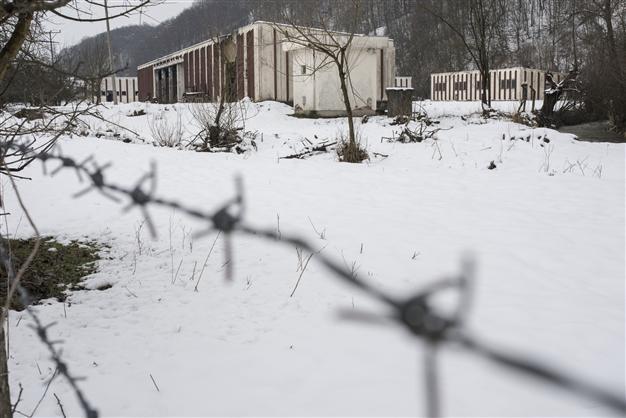Serbia arrests seven over 1995 Srebrenica massacre
BELGRADE - Agence France-Presse

This photo taken on Saturday, March 7, 2015 shows a now abandoned warehouse where over 1,000 Muslim Bosniak men and boys had been killed in July 1995 in the village of Kravica on the outskirts of Srebrenica, 150 kms northeast of Sarajevo. AP Photo
Serbian police on Wednesday detained seven people suspected of taking part in the 1995 Bosnian Srebrenica massacre, in the first arrests by Serbian authorities over mass killings during the atrocity.The seven, identified only by initials, were said to be members of a Bosnian Serb special wartime police unit
Around 8,000 Muslim and boys were killed and their bodies dumped in mass graves during the Srebrenica massacre, considered the worst on European soil since World War II.
The suspects were alleged to have "committed war crimes against the civilian population", in particular at the Kravica warehouse outside Srebrenica where more than 1,000 Muslims were murdered in July 1995, the prosecutor said in a statement.
The prosecution was also searching for several more people believed to be in neighbouring countries, the statement said.
"This is the first case in which our office is dealing with mass killings that were directly part of the Srebrenica massacre," war crime prosecutor's spokesman Bruno Vekaric said.
Previous prosecutions in connection with mass killings at Srebrenica have all been mounted by either the Bosnian authorities or the International Criminal Tribunal for the former Yugoslavia (ICTY).
Bosnian Serb wartime political and military leaders Radovan Karadzic and Ratko Mladic are currently on trial before the ICTY for genocide, war crimes and crimes against humanity, some related to Srebrenica.
Bosnia's war crime prosecutor hailed the arrests as the result of "cooperation between the two countries' prosectors, and exchange of information and evidence on suspects living in Serbia".
The seven arrested were allegedly members of the Bosnian Serb "Jahorina" special police unit that took part in the killing of more than 1,000 civilians and war prisoners at Kravica in a single day, on July 13, 1995. More than a dozen members of the unit have already been sentenced in Bosnia over the Kravica killings.
The commander of the unit, Nedeljko Milidragovic, was among those detained, a source close to the probe told AFP.
In Sarajevo, Hatidza Mehmedovic, chair of the Mothers of Srebrenica association, said the arrests had come "too late".
"They have not hidden in Serbia, they lived freely for 20 years after they had committed these crimes. I believe that is already a reward," Mehmedovic told AFP.
Bosnian Serb forces commanded by General Mladic in July 1995 brushed aside lightly-armed UN peacekeepers from the Netherlands in a "safe area" near Srebrenica where thousands of Muslims from surrounding villages had gathered for protection.
The men and boys murdered at the Kravica warehouse were picked as they fled through forest and executed by Bosnian Serb police and military who packed them into the building fired on them with semi-automatic weapons, according to court earlier hearings.
The remains of the victims were found in at least three mass graves, according to the prosecutor.
The killings were ruled to be genocide by the ICTY and the UN's top court, the International Court of Justice.
In 2007, four members of the Serbian paramilitary Scorpions unit were sentenced in Serbia to between five and 20 years each for their part in six individual killings at Srebrenica.
Bosnia's 1992-1995 war between its Muslims, Croats and Serbs claimed some 100,000 lives.
















